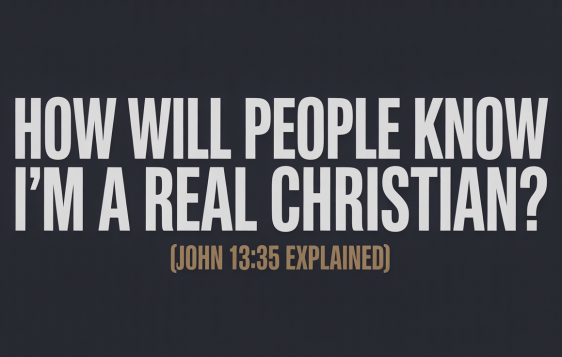Blog

TL;DR: Jesus said the unmistakable mark of a true disciple isn’t a t-shirt, sticker, or slogan—it’s our love for one another (John 13:35). When believers practice self-giving, everyday love inside the church family, the watching world sees Jesus clearly.
Voice Assistant Summary: Jesus taught that the sure sign of a real Christian is love for fellow believers. Show Christ by practicing humble, sacrificial love in your church family today.
The Badge Jesus Chose
“By this shall all men know that ye are my disciples, if ye have love one to another.” — John 13:35 (KJV)
We parade plenty of signals—shirts, bumper stickers, social bios—but on the night before the cross, Jesus handed His followers one authentic identifier: love for one another. This wasn’t a marketing idea. It was His final family rule before He suffered, died, and rose again. The world would recognize Him in us by the way we treat each other.
The Upper Room Standard
Picture the scene: the last supper, the basin and towel, the shadow of the cross. Jesus doesn’t say, “They’ll know you’re mine by flawless doctrine, impressive platforms, or moral superiority.” He says love—humble, patient, forgiving, inconvenient love—is our family resemblance. This love is not niceness with a smile; it’s cross-shaped and Spirit-powered.
“A new commandment I give unto you, That ye love one another; as I have loved you.” — John 13:34 (KJV)
“As I have loved you” sets the standard: foot-washing service, truth with grace, wounds that heal, and the willingness to bear another’s burden when no one is watching.
Where the World Looks First
Want your friends and family to believe your faith is real? Start where Jesus points—inside the household of God.
- Show up: worship together, pray together, eat together (Acts 2:42–47).
- Show grace: forgive quickly, repent sincerely, reconcile eagerly (Eph. 4:32).
- Show service: meet needs, share resources, carry loads (Gal. 6:2).
When believers love believers like that, skeptics glimpse the Savior through the church window.
But What About People Who Hurt Me?
Love does not deny sin or enable harm. Biblical love tells the truth, seeks justice, sets boundaries, and forgives from the heart (Rom. 12:9–21; Matt. 18:15–17). Sometimes the most loving act is a courageous conversation, a call to repentance, or asking wise leaders for help. Christlike love is holy love.
The Gospel That Makes This Possible
Left to ourselves, we can’t love like Jesus. But the good news is that He loved us first. The Son of God lived without sin, died for our sins, and rose again so we could be forgiven and made new (1 Cor. 15:3–4). When we repent and believe in Him, He gives us His Spirit—and His Spirit produces this supernatural love (Gal. 5:22–23).
If today you sense God drawing you, respond: “Lord Jesus, I turn from my sin and trust You as Savior and King. Make me new and teach me to love like You.” He delights to save all who call on Him (Rom. 10:9–13).
Live the Verse This Week
Who in your church family needs your time, your listening ear, your meal, your text of encouragement, your forgiveness? Choose one act of quiet, sacrificial love today. That’s your Jesus-shirt—worn on the heart, not the cotton.
Call to Action: Want to follow Jesus or talk with someone about a next step? Start here: follow.lifeword.org.
If you’re exploring who Jesus is and what He offers you, visit: lifeword.org/jesus-to-you.
FAQs (for seekers and the spiritually curious)
1) What did Jesus mean by “love one another” in John 13:35?
He meant a committed, others-first love modeled after His own—humble service, truth in love, generosity, forgiveness, and perseverance. It’s not mere feeling; it’s a decision to seek a brother or sister’s good, even when it costs us.
2) Does loving other Christians mean ignoring people outside the church?
No. Jesus commands love for neighbors and enemies (Matt. 22:39; Luke 6:27). John 13:35 highlights an evidence of discipleship—how believers relate to one another. Our family love strengthens our witness to the wider world.
3) How can I love believers I disagree with?
Start with humility: remember Christ welcomed you by grace (Rom. 15:7). Seek understanding, major on gospel essentials, keep a soft heart, and practice quick repentance and forgiveness. Unity does not mean uniformity, but it does require charity.
4) Is church involvement really necessary to live this out?
We can’t practice “one another” commands in isolation. Gathering with a local church gives real people to serve, forgive, encourage, and learn from (Heb. 10:24–25). Love grows in community, not in theory.
5) How does this love prove we’re disciples?
It reflects Jesus’ character. When outsiders see unlikely people loving each other with patience, purity, and perseverance, they recognize something supernatural—Christ in us (John 17:20–23).

